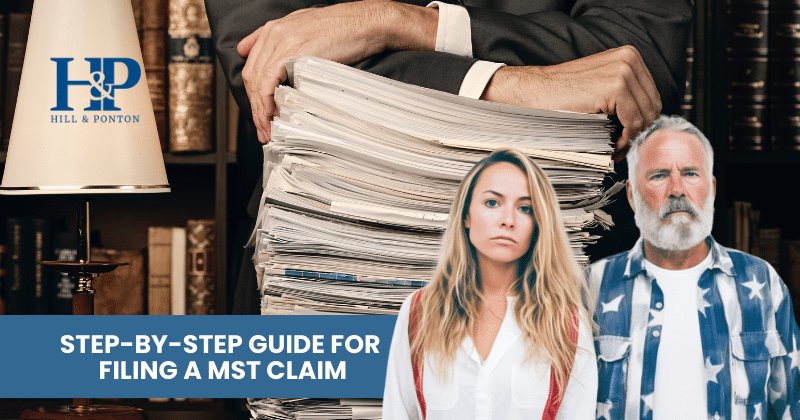Military sexual trauma (MST) is a serious issue that affects veterans who have experienced sexual harassment or assault during their military service.
MST can cause various disabling conditions like post-traumatic stress disorder (PTSD), anxiety, depression, and sexual arousal disorder.
Filing an MST claim is crucial for veterans to access the disability benefits they deserve from the Department of Veterans Affairs (VA).
In this step-by-step guide, we will walk you through the process of filing an MST claim in a simple and easy-to-understand manner.
By following these steps, you can navigate the claim filing process with confidence and increase your chances of obtaining the benefits you need.
Step 1: Understand the Elements of Your Claim
Before you begin filing your MST claim, it’s important to understand the key elements involved.
Military sexual trauma (MST) refers to sexual harassment or physical assault of a sexual nature that occurs during military service.
Both men and women can experience MST, and it can lead to severe and disabling conditions such as PTSD, anxiety, depression, and sexual arousal disorder.
To file a successful MST claim, you need to identify at least one disabling condition that resulted from the MST experience.
The VA recognizes the seriousness and complexity of MST claims, and they handle them differently compared to other issues.
By understanding the elements of your claim, you can effectively communicate your situation and increase your chances of receiving the VA disability benefits you deserve.
Step 2: Gather Required Documentation
To support your MST claim, you will need to gather specific documentation.
Here are the key documents you should collect:
Completed VA Form 21-526
This form is necessary to initiate your claim.
Ensure that you provide accurate and complete information in the form, leaving out only the sections labeled VII, VIII, IX, and X.
Diagnosis from a Healthcare Provider
It’s crucial to obtain a diagnosis from a qualified healthcare provider.
This diagnosis should confirm the presence of a disabling condition such as PTSD, anxiety, depression, or sexual arousal disorder.
Medical documentation helps strengthen your claim.
Nexus Letter/Independent Medical Opinion
A nexus letter is a document from your doctor or medical professional that connects your disability to the MST event during your military service.
This letter should state that it is “more likely than not” that your condition resulted from the MST experience.
A well-written nexus letter can significantly support your claim.
Evidence
Collect any available evidence that can support your MST claim.
In the past, traditional evidence like service medical records, police reports, or rape kits might have been deleted or non-existent due to various reasons.
However, the VA acknowledges the challenges associated with MST claims and accepts alternative evidence.
VA Form 21-0781a – Statement in Support of a Claim for Service Connection for PTSD Secondary to Personal Assault is a helpful tool for providing information that can contribute to your claim.
By gathering the required documentation, you will have a solid foundation for your MST claim.
Remember to make copies of all the documents you submit to the VA, as it’s important to keep a record of your evidence.
Step 3: Collect Supporting Evidence
Supporting evidence plays a crucial role in strengthening your MST claim.
Since MST claims often lack traditional evidence, it’s important to gather alternative evidence that can substantiate your case.
Here’s what you need to do:
Complete VA Form 21-0781a
This form is specifically designed to help you provide the necessary information for your MST claim.
Fill out the form accurately and thoroughly, answering all the questions to the best of your ability.
This will assist in establishing the event, proving the causation or aggravation of your condition, and demonstrating that you continue to suffer from the condition.
Request Retention of Restricted Report Documentation
If you have recently experienced repeated harassment, assault, or rape and are currently in the service, it’s important to request the retention of restricted report documentation.
This ensures that your military records are preserved and not altered or destroyed for a period of 50 years.
Preserving these records is crucial as they may contain critical evidence to support your claim.
Collect Additional Evidence
In addition to completing VA Form 21-0781a, gather any other evidence that can help establish the MST event and its impact on your condition.
This may include medical records, counseling records, statements from witnesses or fellow service members, personal journals or diaries documenting the incidents, letters or emails discussing the incidents sent to trusted individuals, and any relevant photographs or videos.
By collecting supporting evidence, you strengthen the validity of your MST claim and provide a comprehensive picture of your experience to the VA.
Step 4: Complete VA Form 21-526
Completing VA Form 21-526 is a critical step in filing your MST claim.
This form serves as the foundation of your application, providing essential information about your military service, disability, and the impact of MST.
Follow these guidelines to ensure an accurate and complete submission:
Take Your Time
Carefully read the instructions and questions on the form.
Take your time to understand each section before providing your responses.
Avoid rushing through the form to ensure accuracy.
Fill Out All Relevant Sections
Complete all sections of VA Form 21-526, except for those labeled VII, VIII, IX, and X.
Ensure that you provide thorough and detailed information regarding your disability and the connection to the MST event.
Be honest and comprehensive in your responses.
Make Copies
Before submitting your claim, make copies of the completed form and all accompanying documentation.
These copies will serve as your records and can be helpful for future reference.
By accurately completing VA Form 21-526, you provide the VA with the necessary information to evaluate your MST claim.
Step 5: Submit Your Claim
Once you have gathered all the required documentation and completed VA Form 21-526, it’s time to submit your MST claim to the VA.
Follow these steps to ensure a smooth submission process:
File Promptly
It’s important to file your claim as soon as possible.
The date of filing can affect the calculation of your disability benefits, so the earlier you submit, the better.
Don’t delay in initiating the claims process.
Include Required Forms and Documentation
Double-check that you have included all the necessary forms, such as VA Form 21-526, along with your diagnoses, nexus letter, and supporting evidence.
Ensure that everything is properly organized and clearly labeled.
Consider Sending Additional Evidence
If you have collected additional evidence after initially filing your claim, you can submit it separately to the VA.
Sending any new relevant information as you gather it can strengthen your case.
Keep Copies of Everything
Make copies of all the forms and documents you submit to the VA.
This includes both the initial claim submission and any subsequent evidence you provide.
These copies will serve as your records, helping you track the progress of your claim and address any potential issues that may arise.
Submitting your claim in a timely and organized manner increases the chances of a smoother claims process.
By including all the necessary forms and documentation, you provide the VA with the essential information needed to evaluate your MST claim effectively.
The team at Hill & Ponton may be able to assist you with MST benefits, if you are filing an appeal.
Click the button below to get more information.
Step 6: Follow Up and Communicate with the VA
After submitting your MST claim, it’s crucial to maintain regular communication with the VA and stay informed about the progress of your case.
Here’s some tips on how to keep in communication with the VA about your claim:
Respond Promptly
If the VA contacts you with any requests for additional information or clarification, respond promptly.
Timely communication ensures that your claim is processed without unnecessary delays.
Seek Updates
Reach out to the VA periodically to inquire about the status of your claim.
This can be done through phone calls, emails, or accessing your online VA account.
Staying informed about the progress of your claim allows you to track its movement through the system.
Address Concerns
If you have any concerns or questions about your claim, don’t hesitate to discuss them with the VA.
Clear communication helps address any issues that may arise during the claims process.
By actively engaging with the VA, staying updated on your claim’s progress, and addressing any concerns that arise, you can navigate the claims process more effectively and ensure that your MST claim receives the attention it deserves.
Conclusion
Filing a military sexual trauma (MST) claim is an essential step towards accessing the VA disability benefits you deserve as a veteran.
By following this step-by-step guide, you can navigate the claims process with confidence and increase your chances of a successful outcome.
Here’s a summary of the key steps:
- Understand the Elements of Your Claim
- Gather Required Documentation
- Collect Supporting Evidence
- Complete VA Form 21-526
- Submit Your Claim
- Follow Up and Communicate with the VA
By taking these steps, you empower yourself to navigate the claims process effectively and maximize your chances of obtaining the benefits you need.
Remember to keep copies of all documents and maintain open communication with the VA throughout the process.
Filing an MST claim is an important step towards obtaining justice and the support you deserve as a survivor of military sexual trauma.
Don’t hesitate to reach out for professional assistance if needed, and stay persistent in your pursuit of the benefits that can make a meaningful difference in your life.
Your well-being and access to the resources you need are worth fighting for.
Have Questions About How the Claims Process Works?
If you are considering filing an initial claim, or even if you are interested in learning about the appeals process, we offer a free ebook to get you started on the right foot!
The Road to VA Compensation Benefits will help break down the claims process from start to finish. Click the link below to learn more.





